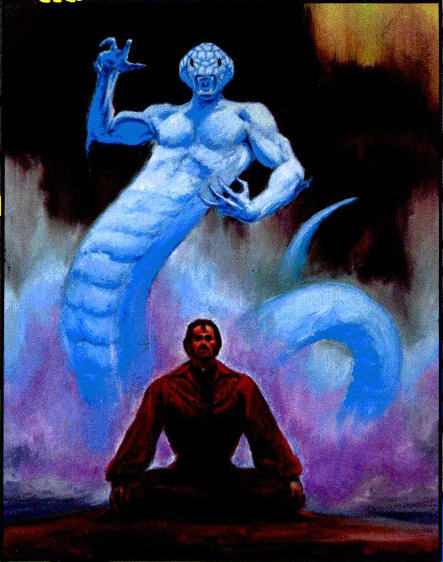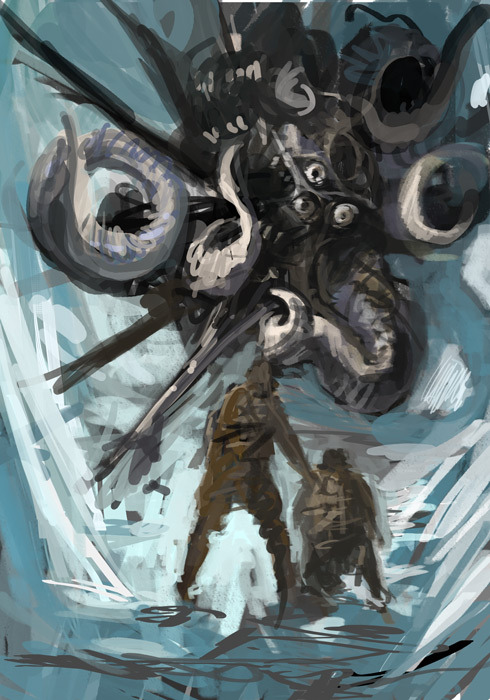 Within the Eradu setting, flavor. A wizard uses the same game mechanics as sorcerer to shoot spells at the players. Wizard, Sorcerer, Nercromancer, Thurmaturgist, and Witch - all the same thing mechanically. I know that some game systems (and maybe the plat books for HM5e) revel in providing numeorus methodologies for which those who wield arcane power utilize them (in other words different rules for different types of magic), but I don't think it is necessary.
Within the Eradu setting, flavor. A wizard uses the same game mechanics as sorcerer to shoot spells at the players. Wizard, Sorcerer, Nercromancer, Thurmaturgist, and Witch - all the same thing mechanically. I know that some game systems (and maybe the plat books for HM5e) revel in providing numeorus methodologies for which those who wield arcane power utilize them (in other words different rules for different types of magic), but I don't think it is necessary.They types of magic-using folks that the party encounters are going to be regional. Zhvoni Magus aren't going to be squatting in a rickety tower in the Ramhorn Mountains - that is the territory of sorcerers, and everyone knows that sorcerers are in league with the ogre king.
On thing the characters are going to have to discover for themselves is what the local wizards are all about. Chances are nothing good, but perhaps they are just misunderstood psychopaths and don't actually intend any harm. The legion of skeletal giant warriors milling about the tower are just from a project that never got finished and aren't of any concern.
Magic in Society
The majority of those that cast magic tend tend to get a bit consumed with the whole thing and lock themselves away in great towers dedicated to their "great work". Once secluded they often go quite horrifically mad (because they get too close to the dungeon that blossoms and grows under their tower) and become inimical t the settlements of the area. What starts out as a servent or two eventually becomes a small army of bugbear that are skulking through the town's shadows at night looking to feed an insatiable lust for leather and blood.
| Because of this, practitioners are generally not looked upon kindly. When entering a settlement, roll 2d6. VIllages are -2, Cities +2, Towns and castles roll with no modifiers. The GM should add modifiers based on any local known wizard towers and how they interact with folks (which is almost always negative). Oddly, a strong concentration of dungeon activity will give a +1 bonus as it creeps into people's minds. Rarely is the attitude about magic going to be generally displayed in town, nor is it going to be a topic of discussion that just "pops up" ... except in the more extreme cases. If a pair of old men playing a card game ask if "Any of you young'uns into that hex and fireball devil shit?" the answer should probably be "no". Casual conversation at the pub can usually spark some insight though. |
|
Wizard Training: Getting Started
Characters playing a mage (or one of the hybrid classes) likely had some sort of training from a wizard, likely in a tower, that ended with the PC either leaving or getting kicked out (the parting is rarely amicable, but it happens). Roll 2d6 for some background (1 BP to re-roll as usual) for Master, once for environment. Then roll 3d6 taking the two that add up the closest to 7, modify, and check results.
| 2d6 | Master | Environment | Results |
| 2 | An abusive asshole (-3 R) | Barely a cave (-3 R) | as #3, but start with some Backlash |
| 3 | Generally negligent and angry (-2 R) | Drafty tower, old gear (-2 R) | as #4, but you also have a quirk or flaw (and gain 0 BP) |
| 4 | Too busy with something else (-2 R) | Moldy spell components (-1 R) | as #5, but you 1d20% fewer SP (check for the amount lost each level) |
| 5 | Thoughtless, but not cruel (-1 R) | Sub-par, but warm at night | as #6, plus you only know 2 spells |
| 6 | Incompetent | Barren but functional | You have a wizard's aura - easy to identify to those who know how to look. |
| 7 | Good intentions only go so far... | Comfortable and quality | You made it out alive. Phew! |
| 8 | He forgot things all the time | Fresh straw in the bed and newish vials of components | You picked up how to disguise your wizard aura. Useful. |
| 9 | Aware and competent (+1 R) | servants and fresh stocks! | As #8, plus gain an extra starting spell (of a random level) |
| 10 | He seemed to actually care (+1 R) | Eye of newt, check. (+1 R) | As #9, plus gain 1 free mastery roll in arcane lore, alchemy, or monster lore. |
| 11 | A skilled mentor (+2 R) | A wondrous array of materials (+2 R) | As #10, plus an additional 1d20p SP gained at each level. |
| 12 | Totally mad, but connected (+3 R) | A seemingly endless supply of high quality experimental resources (+3 R) | As #11, plus 1d100p fractional INT and a 10% chance to start off with a wand. |
Wizard Training: Level 2 and Beyond
Most mages generally tend to be self-trained because, in short, making a deal for formal training with another practitioner usually ends up in trouble. At the same time, getting things lined up with a sorcerer that doesn't appear to be too wildly influenced by the dungeon that is almost certainly growing under their tower can, in fact, lead to some fun adventures. Those who complain that this is not fair and that mages are already difficult to play have never had the joy of actually playing a difficult character.
Totems
 To help a mage deal with the complexities of magic and to help it avoid warping their brain, magi will define a totem that they can use as a metaphor when helping cast spells. Each caster has one that is developed (or discovered some would say) during apprenticeship and is unique. While two witches may both have cats as their totem, one will have a sleek black tom while the other may have an albino tiger.
To help a mage deal with the complexities of magic and to help it avoid warping their brain, magi will define a totem that they can use as a metaphor when helping cast spells. Each caster has one that is developed (or discovered some would say) during apprenticeship and is unique. While two witches may both have cats as their totem, one will have a sleek black tom while the other may have an albino tiger.The caster's totem often (but not always) says quite a bit about their personality. A few examples of known totem: bear, cat, dog, bird, snake, spider, shadow, the sun, fire, ice, blades, shield, smoke,and beer. Each of a caster's spells will take on some aspect of their totem when cast.
If a practitioner concentrates and manages to pass a difficult (or opposed if someone is trying to hide) arcane lore skill check, they will get a feel for the target's totem. The aura doesn't give any details on the caster's abilities, just a general feeling of the totem's aspects.
Minor Magic
A mage may create a minor effect for 1d6p spell points, or a slightly larger effect for 2d6p spell points. The effects must use the caster's totem and relate to a spell that is currently memorized. For example, a bird totem mage with scorch memorized may expend 1d6p SP to have a small phoenix light a nearby candle. Minor magic won't cause damage because it can't pass into the aura of another thing (living or dead). Clever players will find ways to make minor magic quote useful. Each time the SP cost of minor magic penetrates, there is a cumulative +1% chance of a spell mishap the next time a "true" spell is cast.
The Patchwork Kingdom
Previous to HM5e, I had instituted a game mechanic that allowed mages to cast spells above and beyond the book. HM5e has this integrated into the mechanics, which is fantastic and aligns with the way that I envision magic.
The Patchwork Kingdom is a place of strange monstrosities, old gods, feral elemental forces, and untamed madness. Those that dare to meddle with the arcane arts tap into this place, opening portals in their mind and teasing out simple strands of this vicious place.
The formulae that a mage writes down in his grimoire is little more than a series of mnemonic devices to help them cope with retaining and controlling the strange forces they allow to squat in their psyche. When a spell is cast, they release this thread of the patchwork, and gain some respite.
When pulling forth ideas from the patchwork for spells which are not memorized, the mage will expend additional energies to help maintain the conduit and the balance and keep those things which wish to cross over in check. With each spell memorized and each spell cast, the light of Eradu shines through, and the things that lurk in the darkness see and lust after the physical form which they can take. A mage that is too brazen and does not follow their ritual may allow something to come through. Something that that personifies madness and hate. This is the reason that people fear magic - because when wielded carelessly it can bring about dire consequences.
Mishaps vs. Backlash
| Spell mishap determination will be done by the method prescribed in the HM5e GMG. The results, however, will be highly customized - the mishap tiers being replaced with Backlash tiers. Once the tier is determined, the specific style of backlash will be determined, then an effect rolled up. The biggest difference between mishaps and backlash is that backlash is specific to the character based on the spell being cast and, more importantly, their totem. |
|
Physical
Changes in the mage's physical appearance. This could be as simple as a chance in eye color or dramatic as additional limb appearing. With physical maladaptation being the most common result of backlash, those with non-magical physical deformities are often the target of witch hunts and worse. Suddenly being an Albino is a lot more dangerous.
Mental
Sorcerers go mad, everyone knows this. Mental aberrations are often more subtle, but no less dangerous. Consumed by their work, the patchwork kingdom and the living dungeon work their way into the mind of the caster. They become introverts, easily angered, or (most often) revel in delusions of grandeur that, if they pledge themselves to the darkness, may actually come to fruition.
Magical
A caster's spells already have an imprint of their totem, but this imprint may become more pronounced, or a spell may simply refuse to be cast any longer without the expenditure of additional spell points. Perhaps every casting causes all plants within 5' of the wizard to wilt and die. Magical effects are some of the most challenging for a caster because it changes how and what they can do which, in turn, changes who they are.
External
Things come through. It may be mindless scraps of twitching flesh that dissolve once sunlight touches them, a handful of troublesome imps that will perish when the next moon rises, intelligent creatures looking to dominate and destroy, or a physical abstraction of an elder god demanding living souls to feed an ancient hunger. No matter what comes through, though, the wizard's flame burns brighter and the chances of something else coming though are increased.


No comments:
Post a Comment